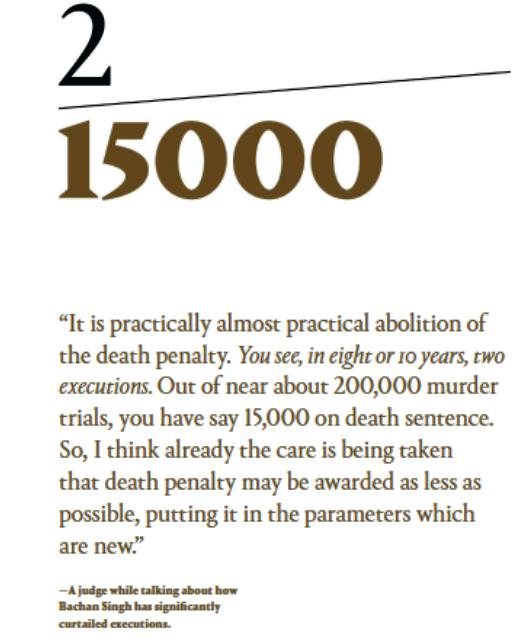
The death penalty would stay on Indian statute books for at least another 50 years, predicted a former Chief Justice of India (CJI) in a wide-ranging study of opinions of former apex court judges conducted by NLU Delhi on the death penalty in India.
NLU Delhi’s Centre on Death Penalty interviewed 60 former Supreme Court judges last year to publish an opinion study titled “Matters of Judgment", and a former Chief Justice of India (CJI) among the interviewees opined that the Indian climate and sentiment was not ready for abolition of the death penalty for another 50 years.
The study explored the reasons former judges saw both in favor of abolition and retention of the death penalty, what they understood to be the “rarest of rare” cases and how fair they perceived the Indian criminal justice system to be in terms of the presence of police torture, the integrity of the evidence collection process, access to legal representation and wrongful convictions.
92 death sentences had been confirmed out of 208 death penalty cases heard by 47 Supreme Court judges between 1975-2017, the report states.
Among other statistics the study threw up: there had been four executions in the last 14 years and 397 prisoners had been affected by the death penalty. 38 out of 39 former Supreme Court judges believed that (police/investigation agency) torture is prevalent in the Indian criminal justice system while one former CJI believed it doesn't happen.
However, 12 out of those 38 judges surveyed on this point provided justification for torture, saying it was a “necessary evil”, according to the report, while the remainder said they believed that torture was “inherently wrong and therefore had no place within the law”.
Five out of those 12 judges justified torture based on poor working conditions of the investigating agencies, according to the report:
Five out of 12 former judges justifying torture said that the police resorted to torture because investigating agencies work under strenuous conditions, without adequate time and independence to investigate cases. A judge who decided six death penalty cases, and confirmed four death sentences in the Supreme Court, shared an anecdote about his relative who was in the Indian Police Service.
The relative objected to the use of torture by deeming it to be legally impermissible and inhumane, and was subsequently told that he “better leave the job” as he was “not fit to be a policeman”. The judge also mentioned that the police’s mindset is affected by how poorly they are treated by VIPs during law and order duties. This in turn affects them, as “when it comes to crime, they will pick up small men and adopt third degree methods, to make them accused and elicit their confessions, whether they have committed crime or not.” The existence of torture was also rationalised by stating that investigating agencies are “either lazy, or don’t have enough manpower, or do not know methods of scientific investigation.”
A judge, who adjudicated 115 murder cases in the Supreme Court, was in dismay over a particular experience at the National Judicial Academy, Bhopal, where he found the majority of participating judges held the view that the truth would not come out unless the police had the power to torture.
17 judges believed that torture undermines the system and 38 out of 58 judges believe that investigation agencies abuse the Code of Criminal Procedure's (CrPC) provisions for “confession”.
One former chief justice of two high courts recounted the suicide of a sessions judge whose reason for killing himself, according to his suicide note, was his belief that he had made a mistake while handing down the death penalty to an accused who had eventually been executed.
The 148-page report is divided into three sections carrying statistics, anecdotes and analysis on investigation, trial, sentencing and judicial attitudes on abolition, retention and “rarest of rare”.
According to the report, 14 former Supreme Court judges believed that reformation had no role to play as a consideration in deciding punishment. One judge who decided nine death penalty cases in six years at the Supreme Court dismissed the notion of reformation as “astrology”. Another judge who decided 13 death penalty cases in five years at the SC also dismissed reformation in serious crimes stating that offenders guilty of petty offences can be reformed but not those who are determined to kill innocent persons.
The NLU Delhi Centre contacted 86 former SC judges through their physical and online mail addresses available on the Supreme Court's website, and for the 60 judges who consented to participate, two interviewers conducted 90-120 minute interviews in person with the judges based on identical structured questionnaires prepared in advance.
In February 2017 the Centre, led by its director Anup Surendranath, had also released a report according to which Indian sessions courts had doubled their rate of handing down death penalty in 2016, since 2015.
threads most popular
thread most upvoted
comment newest
first oldest
first
I wonder if people who condone torture realise that anyone under torture will confess to anything. Honestly, I'd confess to my mobile phone being my mother, if I were subject to "third degree". I am sometimes astounded by the lack of empathy.
Do people actually care that a person they are punishing may be innocent? Or are we just satisfied with a mirage of justice which seems delivered when we are fed our portion of blood? And we celebrate idiots who act all tough and condone torture, as evident from the success of TV shows like 24.
Sad, but unsurprising.
We urgently need police and judicial reform.
(if comment #1 is yours, it's now live ?)
That said, is "human rights agenda" meant to be a criticism? I don't think I've ever met a law professor (outside some radical nutjobs on a few US campuses) who would profess to having an "anti-human rights agenda".
threads most popular
thread most upvoted
comment newest
first oldest
first